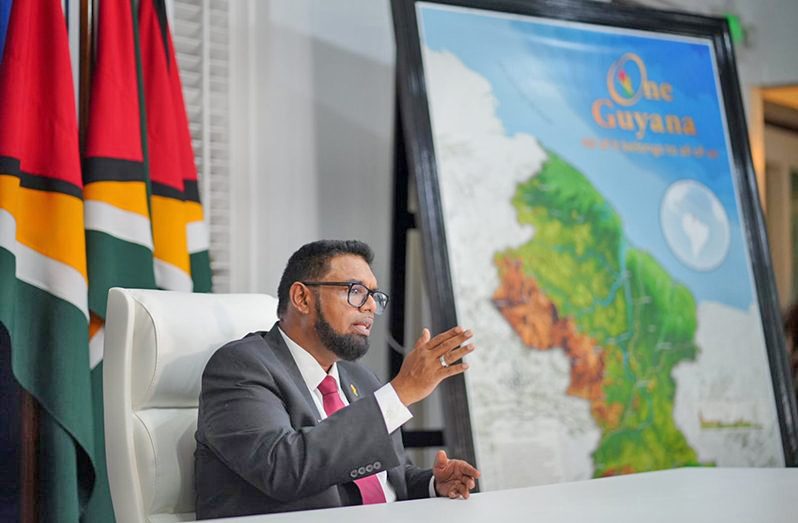Border controversy…
–President Ali says, affirms country enhancing defence capabilities to tackle any eventualities but remains committed to diplomacy, peaceful resolution
AMID escalating aggression from neighbouring Venezuela, President Dr. Irfaan Ali has reaffirmed Guyana’s unwavering commitment to protecting its territorial integrity, and ensuring regional stability, backed by a strong international coalition.
The President reaffirmed the country’s position during his recent interview with BBC’s HARDtalk host Stephen Sackur on the discoveries made by oil giant, ExxonMobil, in the waters off the cost of the Essequibo.
Recently, lawmakers allied to Venezuela’s President Nicolás Maduro approved the creation of a new state in Guyana’s resource-rich Essequibo region.
Despite ongoing proceedings before the International Court of Justice (ICJ), Venezuela has attempted to assert itself to lay claim to Guyana’s territory, citing a December referendum as a so-called “justification.”
Guyana, however, remains steadfast in its position, asserting that its borders are non-negotiable, and reaffirming its sovereignty over the region.
“We will not allow that to happen. And that is why we are before the ICJ, because we believe in the international rule of law. We are a peaceful country; we are a democratic country. We believe in regional stability,” President Ali said as he reaffirmed Guyana’s commitment to peaceful resolutions.
Highlighting the gravity of the situation, President Ali acknowledged Venezuela’s aggressive posture, stating, “We are dealing with a neighbour that is aggressive; that has made certain threats.”
He outlined Guyana’s proactive measures, including investments in military capabilities and infrastructure, to deter any potential aggression. However, President Ali pointed out that Guyana’s first line of defence is diplomacy.
“We are investing in our military; we are investing in the technology of our military. We are investing in infrastructure,” he said.
President Ali underscored the importance of international support, noting endorsements from key allies such as the United States, the United Kingdom, France, Canada, and regional bodies like the Caribbean Community (CARICOM).
He underscored the significance of this coalition in deterring destabilising actions from Venezuela, stating: “We are working on the basis of an international coalition that would not allow this region to be destabilised by any action by Venezuela to overrun our territorial integrity or our borders.”
GUYANA’S READINESS
Addressing recent developments along the border, President Ali affirmed Guyana’s readiness to defend its sovereignty.
“If there is any breach in our territorial space; if there is any action by anyone to destabilise our country, and to invade in any way, shape or form, we will call upon every force and every friend to help us, and to work with us to protect our territorial integrity,” the Head of State said.
Attorney-General and Minister of Legal Affairs Anil Nandlall, S.C., had recently called upon the international community to condemn Venezuela’s recent actions, and to demand compliance with international law, and advocate for peaceful resolution through diplomacy.
“This is not a favour to Guyana, but it is discharging a duty we owe to ourselves and indeed the world, if we are to be true to the founding principles of this organisation,” he said during his address at the 148th Inter-Parliamentary Union Assembly in Geneva, Switzerland.
In 2018, Guyana took a decisive step by approaching the ICJ seeking affirmation of the 1899 Arbitral Award’s legitimacy.
Venezuela, taking a defiant stance, initially claimed that the ICJ lacked jurisdiction, a contention flatly rejected by the World Court in a crucial ruling in December 2020. The door was thus opened for the ICJ to delve into the merits of the substantive case.
The substantive case, which highlights the historical context and the 1899 Arbitral Award, remains before the World Court.
In response to Venezuela’s actions, Guyana has been bolstering its defence and diplomatic efforts with the help of international partners, including the United States, aiming to counter security threats while promoting regional stability.
Despite these preparations, Guyanese officials have reiterated their focus on defence rather than offence.
Guyana, among other things, also remains committed to the Argyle Declaration, which was the result of a meeting between President Dr. Irfaan Ali and his Venezuelan counterpart last December.
This agreement includes both countries committing to avoid the use of force, and advocating for dialogue and co-operation to prevent tensions.



.jpg)










